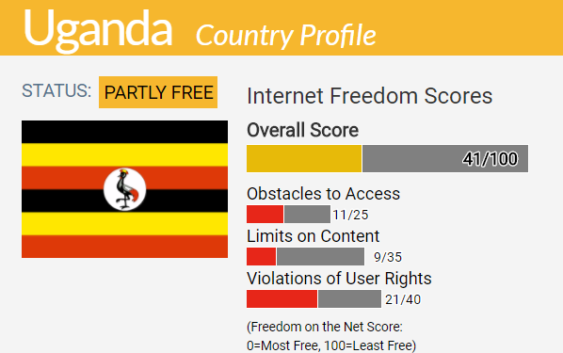- Governor Sanwo-Olu flags off Ojota-Opebi Link Bridge, to be completed in 20 months
- Allow Nigeria go to 2022 World Cup, don’t play qualifiers – Ghana Parliament member tells Black Stars
- There was no second sex tape, Kim Kardashian refutes Kanye West’s claims
- Jaruma Remanded In Prison Over Post On Regina Daniels And Ned Nwoko
- Lanre Gentry confirms paternity of last son with Mercy Aigbe, says ‘He’s my son’ (Photo)
Uganda is making ISPs block pornography from its citizens

Uganda’s communications regulator has directed internet service providers, to block 27 websites for “streaming pornographic content to Uganda,” according to a directive dated Jul. 6. It lists 10 international adult content websites and 17 local websites most of which advertise escort services.
The directive was buried under the furor surrounding an earlier decision by the regulator to block 58 social media and communications apps & services unless users pay a controversial social media tax.
This latest development to block pornography is line with previous state actions targeting and controlling how Ugandans use or consume internet content.
“It’s another nail in the coffin,” says Kyle Spencer, the executive director of Uganda Internet Exchange Point. In March, the government agency ordered bloggers, podcasters, news website and online video channels to register & obtain permission to publish from it, threatening that it would direct internet service providers to block access to unregistered sites. On Jul. 1, the tax authorities in Uganda started charging citizens a daily level to access social media sites like Facebook and WhatsApp. Prior to that, law enforcement in the country had long established a pattern of arresting users for publishing content the authorities frown upon. “Not only is it censorship, it also reduces demand for the internet. It has an impact on how much you then can scale internet use,” Spencer says, on the impact of these actions.
Echoing the same frustration, Wairagala Wakabi, the executive director of CIPESA, a respected think tank on internet governance in the region, accused the communications regulator of being “overzealous” and “obsessed with regulations that violate the privacy of individuals or infringe on free speech.”
In the letter to the internet service providers, the regulator says it got the list of websites to block, from the country’s Pornography Control Committee. It’s a nine-member team established in August 2017 to detect and prohibit the consumption of pornography in the country. It has previously tried to procure a pornography detection machine. Having failing to get that machine, the committee chairperson boasted to journalists that “the biggest machine is UCC.” Wakabi admonishes the latter for falling into that role. “A communications regulator should know better. They didn’t have to issue a directive simply because they were asked by pornography committee. UCC can stand up to that.”
Rwanda’s last election cycle provided an example of the kind of rights-sensitive regulation Wakabi calls for. In May 2017 Rwanda’s electoral commission announced that social media updates by presidential candidates had to be submitted to it for pre-approval. The communications regulator issued a rebuttal, re-affirming “the right of citizens to express themselves on social media and other ICT platforms.”
Internet service providers in the country didn’t immediately block the pornography websites. However, when news of the directive filtered into the public domain on Friday, the executive director of the Uganda Communications Commission told journalists that network operators would be penalized for not complying. By Monday morning, smaller providers had blocked the sites but larger ones don’t seem to have complied.
In practical terms, it’s unclear if banning just 10 international adult websites can have much of an impact on Ugandans’ online habits given the proliferation of pornography across hundreds, if not thousands of websites. Uganda’s increasing trend toward internet censorship has seen the use of virtual private networks skyrocket even as the government has tried to also ban them.
Non-compliance is not the typical reaction from the network operators in the country. In recent years, they have implemented every internet blockade directed by the regulator: in February 2016 during the presidential elections, again in May that as the country’s president of 32 years was being sworn in for a fresh term in office, and in starting Jul 1, a targeted blocking of social media to collect a controversial new government levy.
Industry observers don’t think the companies are running as much risk as the regulator threatens, if they don’t comply. “It’s possibility that the regulator could suspend their license but I would dare the government to do that. Imagine what would happen if tomorrow, MTN was no more,” Spencer says. MTN Uganda, the local operation of a multi-national South Africa operator, serves about 10.8 million of the nearly 25 million mobile phone subscriptions in the country. “Individually and collectively, they can push back,” Spencer says.
Customers’ access to pornography just might prove to be where the operators draw the line.
==msn